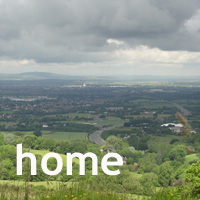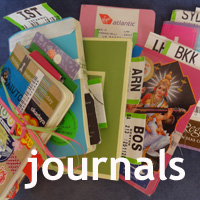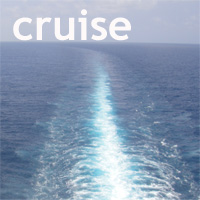Polonnaruwa
 Friday, April 22, 2011 at 3:09AM
Friday, April 22, 2011 at 3:09AM
Kerching! Our first visit to Sri Lanka and another country ticked off.
We love the skies here, especially first thing in the morning as the sun rises. this morning was no exception and as we sailed into Trincomalee we caught our first sight of land.
We’d planned a long day today, driving with ten of our fellow passengers to Polonnaruwa, the ruined medieval city. Our guide, Ranjit, made it clear from the start that we would need to stick to time. He begged us to be prompt when returning to the minibus and outlined the timetable for the day. However, though he’d allowed for the time to drive to the first stop, the calculation had been somewhat optimistic – the roads were terribly bumpy and it took us over an hour and a half to drive the first 20 miles, from where there was a “lovely carpeted stretch road” (Ranjit’s words, not mine!)
Upon leaving the port area, we formed a convoy with police escort – our first surprise of the day being the level of (armed) military and police presence. Every mile or so along the road was a checkpoint, manned by two young officers bearing what looked like serious weapons. Thinking it not a good idea to photograph these officers, a picture of their small shelter will have to do!
The contrasts between India and Sri Lanka were immediately apparent. Lacking the same density of population and being altogether greener and more lush, the conversation around us was one of relief. Certainly we saw little of the absolute and abject poverty we witnessed in Chennai.
But as in India, the predominant advertising is for cellphone companies, which is a little inconsistent with the very basic commercial properties they adorn!
It being Good Friday (and a holiday here), we passed several community events taking place. One cycle race was progressing nicely, with spectators standing by the roadside with buckets of water to throw at the riders as they passed! All very reminiscent of Song Kran in Thailand.
Ranjit talked about the wildlife here and sure enough, as the day progressed, we found ourselves recording a little safari-like list of creatures. The one which eluded us however was the national animal – the giant squirrel of Sri Lanka, described by Ranjit in such a way that had we seen one we would have been surely disappointed! We made do with a few monkeys, a couple of jackals and a mongoose to be going on with. Oh, not counting the hundreds and hundreds of stray and mangy looking dogs which were everywhere.
A herd of water buffalo were enjoying the cool lake – or “tank” as Ranjit describes these manmade reservoirs, and we kept an eye out for wild elephants, as well as that giant squirrel!
We drove through teak forests, palmyra plantations and paddy fields as he told us about the airforce who now offer tourist flights over the island and the navy, who offer whale watching expeditions.
We passed a few games of cricket going on too and after a brief stop to use the facilities at a smart hotel, we found ourselves in Polonnaruwa, entering via the museum (no photographs). We passed through at breakneck speed, just long enough to catch a glimpse of the background to the place and enabling us to put the individual ruins into perspective. This is a large archaeological site and we’d see just a small part of it today.
I scribbled and drew, filled several pages with jots that made sense to me then but will probably be meaningless unless I clarify them sooner rather than later.
Out into the heat again, and we began our walk through the principal area of the site. The Kings Palace had been a magnificent seven storey structure, the top five floors made of wood, the bottom two (which survive in part) built of brick. Square in shape, we’d seen the model of the original structure in the museum recently enough to be able to imagine how it was.
I loved the elephant frieze at the base of this temple structure.
The Moonstone at the entry to the temple was also spectacular. In fact, we saw several of these stones on this site and I jotted down a reminder to myself to investigate further.
Stepping over the moonstone and up the steps to the elevated structure above, there were finely carved columns standing absolutely straight and forming a lovely regular pattern.
Returning promptly to our minibus (would we have dared do otherwise?) we were relieved to see that it was the local tourists who were the focus of attention from lottery ticket salesmen, snack vendors and so on.
We drove to another area of the ruins, this time to see reconstructed temples marked with the archaeologists references and put back – more or less – as they had been. This was fascinating, because though these pieces were clearly correctly placed, they were just not quite right giving a peculiarly offset and abstracted appearance to the whole structure.
This is a place where I would have enjoyed a while longer, to draw and absorb more of the shapes and patterns around me. But no time, no time…
I stepped out of my shoes, took my hat off and dived inside a small temple where offerings to a small buddha had been made in the form of a shape made out of flowerbuds on a stone tablet. The light was streaming in through a couple of slits in the wall and a few devotional candles were burning – the atmosphere was damp and murky, the air fragrant from the blossoms offset with the smell of burning tallow. It was a relief to step outside again.
A bunch of schoolchildren were waiting to greet me – they were doing a project interviewing foreigners and though time was tight, I couldn’t refuse their charming approach. We went through the usual details – what was my name, where did I come from, what was my job (when I replied “teacher” they giggled and feigned fear!) what was my impression of Sri Lanka and finally, would I return? Such friendliness was apparent throughout the day and the answer would be a definite yes.
A few more temples, a few more ruins which once again give the impression we were the only ones there. Not true!
Some beautiful layered views through archways and windows. Some of these buildings (but not necessarily all of those in the pictures) had been built by successive kings to house the holy relic of the Buddha’s tooth – now housed in Kandy, we are informed.
Finally, we reached the impressive coliseum-like structure of which we’d seen a model in the museum – but of course, we had to hurry hurry hurry, time to go.
Walking past the monkeys on the way to the carved stone buddhas, I remembered that Ranjit had promised to tell us the difference between a reclining buddha (resting) and a reclining buddha (passed away) – but it was too late.
I think this is a reclining buddha (passed away) but can’t be sure and simply add this one to the list of “things to find out more about”. Rules here: no shoes, no hats, no photographs to be taken with one’s back facing the buddha.
Three figures all carved from one stretch of rockface. Exquisite.
Back on the minibus, we were given the choice – should we ride an elephant first or have lunch? We chose to eat first, ride later, but in the meantime enjoyed the “beware iguanas crossing” signs (and later, an iguana who safely negotiated the traffic) and another rather charming fellow standing by the side of the road, posing for photos
Isn’t he great? Though Ranjit had told us there were wild elephants around here, we didn’t really think we’d see any quite so close.
Anyway, lunchtime, which took the form of a delicious hot buffet of traditional Sri Lankan food served by the lake (tank!) on lotus leaf plates
and dessert
However, no sooner had I said “you know, I think it feels a bit like rain”, there was the unmistakeable “plop plop” of penny sized raindrops, soon followed by a downpour of tropical proportions.
We ran for cover but still got soaked through and appreciated the towels which were quickly brought for us. As we stood in the shelter of the hotel reception, the bedraggled group of elephant riders came in – it appeared we’d made the best choice to eat first.
Still, the rain was beginning to ease off a bit, the skies were brightening and we said we’d go ahead and do the elephant thing regardless.
But we ought to have known better and learned from previous elephant-riding outings – sitting ten feet from the ground on a wet and dirty howdah which is slipping all over the place because it wasn’t loaded properly in the haste of the afternoon is not the most comfortable way to ride an elephant (even if it does make for good dinner party conversation later in the day)
Fortunately the ride was short and the rain held off until the very last minute. But we were already soaked, had gone through an ersatz car-wash in the form of a few trees along the way and by the time we got back on the bus, we were filthy, wet and tired. Were we ready for two and a half hours bumpy ride home? I guess so. Ranjit put on a video of Sri Lanka for us to watch, and several more elephants, peacocks and monkeys came out of the greenery along the way, too. We simply sat and (literally) steamed.
Turning the last corner, we spotted we were “home” – five minutes before the “all on board” signal. We ran upstairs and straight out onto our verandah for our sailaway.
Waving to the families who had come to wish us goodbye, we were under way again.
Next stop, Galle, tomorrow lunchtime. Bye Trincomalee!
(A shower never felt so good)
 Gill Thomas |
Gill Thomas |  1 Comment |
1 Comment |  SriLanka in
SriLanka in  cruise,
cruise,  food,
food,  travelling
travelling 







Reader Comments (1)
So glad you are having a wonderful time Gill. I love Sri Lanka and reading Good Friday's post was nearly as good as being there. Particularly as when we visited Galle it was too wet to leave the taxi to visit the fort. Enjoy. x